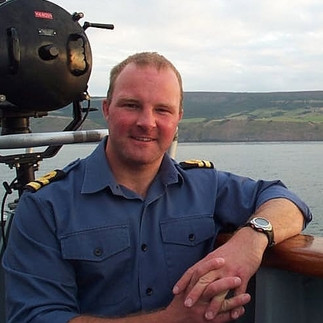Thinker, sailor, author, physio. Justin's journey so far..
- Jan 22, 2023
- 4 min read
Written by Justin Strain, ARC Wessex Intern and a Clinical Specialist Physiotherapist in Pain Management and Spines, working at Hythe on the edge of the New Forest
I began my healthcare career a little later than most. At the age of thirty, after a short career in the Royal Navy, I took my first steps into the University of Southampton’s School of Health Professions.
I was interested in research from day one. The importance of evidenced-based practice was drummed into us throughout our time at university. From the moment we first wielded a tendon hammer or a stethoscope we were encouraged to ask ourselves those all-important questions: What is the best treatment? Does it work? Why am I doing this?
Starting out as a musculoskeletal physiotherapist, I threw myself into clinical practice, desperate to learn every treatment technique and test I could get my hands on. I believed that being a great clinician was about perfecting those tricky manual techniques and learning everything there was to know about anatomy. Or so I thought.
Thinking differently
Later, as I developed in confidence, I began to think differently about my practice. It seemed to me that what made most difference to my patients was the therapeutic relationship. Understanding the patient’s experience and learning to listen more and communicate better (and sometimes talk less!) started to seem more important than having the biggest toolbox of treatment techniques. Specialising in pain management helped me to appreciate how peoples’ experiences of health-conditions and healthcare were shaped by a complex web of social and personal interactions, making each person’s experience unique to them.
The need to understand these unique experiences drew me to qualitative research. I wanted to go further than comparing different interventions. I wanted to understand the stories of the people at the heart of those interventions – our patients.
The importance of narrative was not new to me. In my non-clinical life, I write children’s novels – I’ve written two so far and I’m working on a third. In my novel writing, I enjoy the magic of exploring fictional worlds from other peoples’ perspectives.
"I’ve always found that what brings a novel to life is the personal connection between the reader and the characters. I wanted to apply a similar approach to understanding patients’ stories - listening to, understanding and recording other peoples’ perspectives, and acknowledging the role of the researcher and the reader in interpreting those perspectives."
While I was taking my first tentative steps towards qualitative research, the world of healthcare research was changing. The n=1 campaign was gathering momentum, and recognition of qualitative research was increasing. I wanted to get more involved, and found myself looking for the right opportunity.
Then, at the beginning of 2020, the world turned upside down with the advent of the COVID 19 pandemic.
Along with many other things, the COVID 19 situation has highlighted the need for research – to explore the impact of immediate responses to the crisis, and also to understand how the pandemic will influence longer term changes in how healthcare is delivered.
One of those long-term changes is likely to be the proliferation of online healthcare. The plethora of online health interventions now on offer enables people to access consultations and courses that might previously not have been available to them, in a safe, socially distant way. I felt this area was worthy of more exploration, and I wanted to listen to the stories of service users, to understand how these changes had impacted on their experiences. I resolved to start a research project looking at patients’ experiences of online pain management in our own service, but I was struggling to find the time - alongside a busy job in clinical practice, dealing with redeployment and the current challenges of COVID 19, and being dad for our two wonderful children.
"The NIHR ARC Wessex Clinical Academic Internship has given me that time. It has enabled me to build and apply my skills in research as part of my clinical job, making a difference to how I can support patients within my service."
So where am I now?
I am in the early stages of my project – a systematic review of qualitative literature about patients’ experiences of online pain management, combined with semi-structured interviews with patients who have completed the online pain management programme within our own service.
As well as time, the Clinical Academic Internship has provided a network of similarly minded people, interested in research and qualitative exploration of issues. The excellent events run by NIHR ARC Wessex have introduced me to new research concepts and skills.
My supervisors, Dr Euan Sadler and Dr Lindsay Welch, have been extremely supportive and with their help my skills and confidence are growing. I am planning to complete my project in Autumn this year and I am hopeful that this will lead on to a pre-doctoral, and eventually a doctoral fellowship with NIHR ARC Wessex in the future.

Dr Lindsay Welch is a Lecturer in Adult Nursing and a Researcher in long term conditions.

Dr Euan Sadler is an Associate Clinical Professor of Older People and Frailty within Health Sciences at the University of Southampton.









